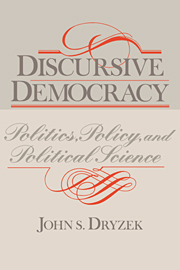6 - Policy Sciences of Democracy
from III - Public Policy
Published online by Cambridge University Press: 12 October 2018
Summary
If the past belongs to material production and control over the means of physical coercion, then arguably the future belongs to information. Economy and society are becoming increasingly organized around the production, transmission, reception, and transformation of information rather than around material goods. Material production itself is now largely coordinated by informational technology. The ultimate political consequences of this informational revolution are decidedly uncertain. The new technology and its associated ways of life may remain thoroughly under the control of experts and manipulators, one more agent for instrumental rationalization. But more democratic outcomes are conceivable, especially if control over information and knowledge can be decentralized to a competent citizenry (Barber, 1984, pp. 273- 9; Luke and White, 1985).
In this chapter and the one that follows I shall address one particular kind of knowledge-based activity that has made some headway in the world's polyarchies in recent decades, the idea of a policy science. Although professional policy analysis now plays some part in the governance of liberal democracies, it is among their social scientists that the aspiration toward a successful policy science has really taken root. Aside from a simple desire to apply social science expertise to policy problems, this program has been advanced as a means of organizing the various social sciences around a problem-solving focus that would both end their identity crises and improve their prospects for attracting government grants (Charlesworth, 1972; Horowitz, 1981). Although the desire for lucre is hard to defend, no apology is necessary for a problem-solving focus in social science and politics as long as war, inequality, poverty, structural violence, and ecological crisis exist.
In terms of the contemporary intellectual division of labor my main concern in this chapter is with the field of policy analysis, which may be defined as “an applied social science discipline which uses multiple methods of inquiry and argument to produce and transform policy-relevant information that may be utilized in political settings to resolve policy problems” (Dunn, 1981, p. 35). But for the sake of continuity with some classic expressions about policy sciences of democracy and tyranny (introduced in what follows), I will use the terms “policy analysis” and “policy science” interchangeably in this chapter. I attach no further connotations to the word “science” in this context and profess only agnosticism on the actual or potential scientific status of policy analysis.
- Type
- Chapter
- Information
- Discursive DemocracyPolitics, Policy, and Political Science, pp. 111 - 132Publisher: Cambridge University PressPrint publication year: 1990
- 1
- Cited by



